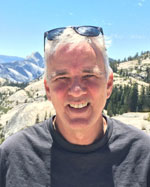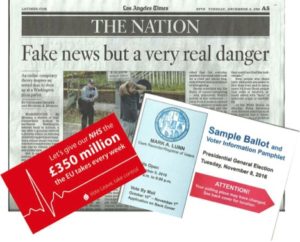Geography in a Post-Truth World
 This past month the Oxford Dictionary named “post-truth” as its 2016 Word-of-the-Year. The word was chosen because it has seen a “spike in frequency this year in the context of the European Union referendum in the United Kingdom and the presidential election in the United States” and “has gone from being a peripheral term to being a mainstay in political commentary.” For scholars and educators the idea that being truthful is now optional should be deeply troubling, as it undermines the ethical and operational foundations upon which we function. In this column I want to explore the turn towards a post-truth world.
This past month the Oxford Dictionary named “post-truth” as its 2016 Word-of-the-Year. The word was chosen because it has seen a “spike in frequency this year in the context of the European Union referendum in the United Kingdom and the presidential election in the United States” and “has gone from being a peripheral term to being a mainstay in political commentary.” For scholars and educators the idea that being truthful is now optional should be deeply troubling, as it undermines the ethical and operational foundations upon which we function. In this column I want to explore the turn towards a post-truth world.
 Two other similar descriptors have become more widespread in recent years — post-factual and post-rational. I believe that these terms are all part of the same sociological and political trend, but have important differences. Post-factual does not necessarily mean being untruthful, it may represent situations in which pertinent factual information is either not sought, not considered, not valued, or is simply reviled. The term post-truth implies deliberate provision or knowing acceptance of information that is known to be untruthful. I would suggest the deliberate suppression of factual information would also fall under this rubric. Post-rational suggests situations in which facts, reasoning and logic are deemed unnecessary or even loathed when decisions are taken. The term post-truth is widely used in a sense that captures all three of these issues. In the context of western philosophy and history, an increasingly post-truth world can be seen as a rejection of 300 years of scientific, socioeconomic and political development that was initiated by the Age of Enlightenment in the 18th century.
Two other similar descriptors have become more widespread in recent years — post-factual and post-rational. I believe that these terms are all part of the same sociological and political trend, but have important differences. Post-factual does not necessarily mean being untruthful, it may represent situations in which pertinent factual information is either not sought, not considered, not valued, or is simply reviled. The term post-truth implies deliberate provision or knowing acceptance of information that is known to be untruthful. I would suggest the deliberate suppression of factual information would also fall under this rubric. Post-rational suggests situations in which facts, reasoning and logic are deemed unnecessary or even loathed when decisions are taken. The term post-truth is widely used in a sense that captures all three of these issues. In the context of western philosophy and history, an increasingly post-truth world can be seen as a rejection of 300 years of scientific, socioeconomic and political development that was initiated by the Age of Enlightenment in the 18th century.
At the moment post-truth phenomenon is sending shockwaves through the body politic and causing concern about the future of democracy. As political economy professor William Davies pointed out this August in The New York Times, “Facts hold a sacred place in Western liberal democracies. Whenever democracy seems to be going awry, when voters are manipulated or politicians are ducking questions, we turn to facts for salvation. But they seem to be losing their ability to support consensus.” The Brexit referendum and U.S. Presidential election offered political pundits much evidence of a turn towards post-truth. For example, a centerpiece of the Brexit Leave campaign was the claim that the EU is taking £350 million a week from the U.K. and that this money could be spent on the National Health System. This figure was so misleading that it drew an official rebuke by the U.K. Statistics Office and yet the Leave campaign continued to cite it. After the election the figure and promise to give those funds to the National Health System was then disavowed by one of the leaders of the Leave campaign, Nigel Farage. Yet due to this post-truth campaigning, some 47 percent of British voters surveyed accepted the figure and an additional 14 percent were uncertain of its legitimacy. Immediately following the vote some 6 percent of the Leave supporters stated they wished they had voted to remain in the EU. Either they did not understand their “protest” vote would count in such a tight election or they did not fully reason the consequences of a vote to leave the EU. This seems to me an example of the post-factual, post-truth and post-rational.
Turning to the U.S. — according the Pulitzer-Prize-winning site Politifact, some 51 percent of the checked statements made by Donald Trump and 12 percent of those by Hillary Clinton were deemed false or worse. Although both candidates appear to have made false statements, the large difference in the proportion of such statements between the eventual President Elect and Hillary Clinton indicates that facts and demonstrable truthfulness were not deciding factors in the election. In some cases the dismissal of facts and truthfulness may be an informed and deliberate choice on the part of the voter. As Salena Zito famously wrote about Donald Trump in The Atlantic, “the press takes him literally, but not seriously; his supporters take him seriously, but not literally.”
Donald Trump’s capacity to win voters’ trust in him as a leader despite a lack of veracity in many of his statements was no doubt honed by his experience in modern broadcast and digital media. It cannot be assumed though that the public recognize political statements as false in all cases. The recent U.S. election was marked by an incredible amount of “fake news” containing lies and outrageous speculations. The fake news problem has become viral due to the ability of its practitioners to use the web to reach huge and widely dispersed audiences. It would be wrong to think that the turn to a post-truth world, fueled in part by a changing media, is a new phenomenon created by these recent elections. Almost two decades ago, Carl Bybee wrote in Journalism & Communication Monographs, “we appear to have moved into a post-factual age where the border between fact and fiction, news and entertainment, information and advertisements has increasingly blurred.”
So, what does this evolving and potentially post-truth word mean for scholarship and geography? Let’s tackle the sciences, as that is the realm I know best. Scientists often decry the divergent views on what is factual or true between themselves and the public. According to a 2015 study by the Pew Research Center, despite the scientific evidence to the contrary and large consensus amongst scientists, 32 percent of the adult U.S. public do not believe in the value of mandatory childhood vaccinations, 63 percent do not feel it is safe to eat genetically engineered foods, 50 percent do not believe in anthropogenic climate change and 35 percent do not believe humans evolved over time. Scientists often lament and ponder why the facts or consensus opinions from our hard work is so widely dismissed, even in instances when there are measurable and repeatable observations (“facts”) to back it up. In some cases, such as the anti-vaccine movement, the contra-factual trend is more or less grass-roots in nature, fueled by personal fears, religious beliefs, political ideologies or misinformation. In other cases, however, public skepticism and dismissal of scientific results arise from sophisticated and large-scale media campaigns and political lobbying by special interests, such as the tobacco or fossil fuel industries. As described in Naomi Oreskes and Erik Conway’s book, Merchants of Doubt, such campaigns, often co-opting scientists, have suppressed facts or spread false information. Healthy skepticism and inquiry is good, deliberate sowing of misinformation is not. In either case, the powerful tool of the Internet now allows the unprecedented spread of both valid factual information and misinformation alike.
Perhaps more troubling in the context of creating a post-truth world are governmental attempts to suppress facts and research. This both denies factual information to the public and policy, but also reinforces messages that facts do not matter and those facts that you do not like can simply be suppressed. For example, as reported in Science, in 2012 the North Carolina legislature passed HB 819, a measure that initially banned the use of scientific sea-level rise projections in coastal planning. This was a response to a scientific study that outlined the dire impacts or projected sea-level rise on the state’s coastline. In Canada, the government of Prime Minister Stephen Harper placed severe restrictions on the public communication of science by Federal scientists. As reported in Nature, The Professional Institute of the Public Service of Canada summed up the situation this way, “Here’s how we do things in the Harper government” — “We muzzle scientists, we cut research and we ignore anyone who doesn’t tell us what we want to hear.” Looking at the recent U.S. election, the The Guardian newspaper interviewed Trump science advisor, Bob Walker, and concluded, “Donald Trump is poised to eliminate all climate-change research conducted by NASA as part of a crackdown on “politicized science.” It remains to be seen if this is an overstatement by the Guardian or an accurate take on the situation ahead.
The issues and concerns outlined above extend beyond the natural sciences. In Canada, the former government of Prime Minister Stephen Harper did away with the mandatory long-form census, a tool vital to collecting social sciences data. A Conservative Party advisor summed up the reasoning succinctly in The National Post newspaper, “If it can’t be measured, future governments can’t pander. I imagine that [in] Stephen Harper’s view, Canada should be a country of individual initiative, not one of collective dependence ‘justified’ through the collection of data.” I am not sure I know of a clearer statement of the cynicism and unethical quest for political expediency that is fueling the march towards a post-truth world.
The healthy and vital debates which we have as scientists and scholars about our research and how we go about it have also been cited as helping drive the movement towards a post-truth world. Andrew Calcutt’s op-ed, entitled “Forget Brexit and Trump, “post-truth” was spawned by the liberal left long ago,” provides a particularly strong take on the role of academic concepts of social constructionism in the current turn towards a post-truth world. Geographer David Demeritt has long worked on social constructionism in the sciences, and in a 2001 paper in the Annals he points out that “This political strategy of social construction as refutation has been pursued by the so-called climate skeptics and other opponents of the Kyoto Protocol.”
So, where does this leave us as individual geographers and the AAG? Because our discipline deals with so many socially, economically, culturally and environmentally relevant issues, we have a particular need to be concerned about this turn towards the post-truth. For example, many of our members work with earth-surface data and support provided by NASA. Defunding those programs would disrupt our work, and also decrease our ability to help inform the public and policy makers about important issues. I can envision many other areas of physical and human geography where the embrace of post-truth policies and public perceptions will be deeply felt by geographers and limit our efforts to contribute geographical knowledge to the public and policy makers.
However, to address these challenges we must move beyond past standard responses. I believe that, as scholars, we must understand that for many people the facts do not “speak for themselves” and that lines on graphs and numbers in tables do not carry the persuasive weight we might think they do. Neither can we assume that somehow our presumed academic authority on a topic translates to public trust. As scholars we progress in part through our skepticism of orthodoxies — why should we expect others, including the public, not to do the same? In his Annals article David Demerritt urges the scientific community to recognize “Science does not offer the final word, and its public authority should not be based on the myth that it does, because such an understanding of science ignores the ongoing process of organized skepticism that is, in fact, the secret of its epistemic success. Instead scientific knowledge should be presented more conditionally as the best that we can do for the moment. Though perhaps less authoritative, such a reflexive understanding of science in the making provides an answer to the climate skeptics and their attempts to refute global warming as merely a social construction.” I quote this passage at length because I believe it pertains not just to scientists and the issue of climate change, but to every sphere in which we, as scholars and teachers of geography, operate and wish to effectively counter the post-truth world. It is important to understand that these efforts demand truthfulness, self-examination and full-disclosure on our part. If recent political events and the rise of the post-truth world tell us anything, it is that facts in-and-of-themselves are not enough, we must also engender trust if we want our messages heard and valued.
As an association the AAG will continue to do what it has long done to monitor and respond to efforts to stifle or censure geographic research, education or the dissemination of geographic knowledge. We will work to make sure that the public and public policy makers have access to, and are informed by, geographic knowledge. We will work to make sure that such efforts support geographers and their work regardless of race, national origin, religion, sexual orientation or disabilities. When appropriate we will join with other scholarly associations in these actions. In these efforts we need the aid of our members in bringing the problems engendered by the post-truth world to the attention of the association and in helping to tackle them. In pursuit of a world that is truthful and rational we have our work to do — both individually and collectively.
Join the conversation on Twitter #PresidentAAG
—Glen M. MacDonald

